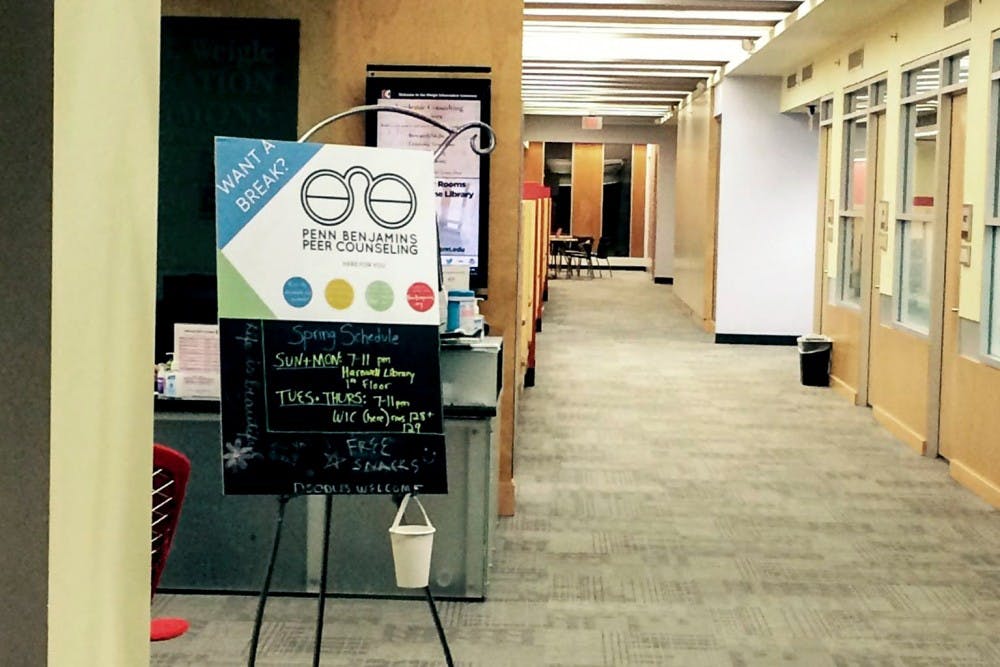
Penn has more than 11,000 graduate students and according to a new survey, nearly half of them are struggling with feelings of depression.
The Graduate and Professional Student Assembly recently administered a survey that garnered 1,456 responses — about 12.5 percent of Penn's total graduate student population. Forty-three percent of respondents reported being “so depressed it was difficult to function,” and 70 percent reported “feeling overwhelming anxiety.” The survey was sent out by GAPSA to every graduate and professional student last April and results were compiled this summer.
Many of the anonymous student comments in the survey cited unsupportive academic advisors, financial stress, and a toxic work culture at Penn as key challenges to their mental health on campus.
Chair of GAPSA’s Student Life Committee and Nursing doctoral candidate Matthew Lee said these issues were relevant to students across all schools. Lee, who helped conduct the survey, added that he found the results “unnerving.”
"Some of the factors behind it are the greater social isolation," Lee said. "The grad community is not as tightly knit as the undergrad community."
The survey is helping to inform several ongoing mental health initiatives within the graduate student community, including the establishment of Penn Franklins, a graduate support group.
Lee, along with GAPSA Deputy for Mental Health and candidate for a master's degree in philosophy in education Mandy Lin, began organizing the support group Franklins in fall 2017. The group tentatively plans to open by the end of September for walk-in appointments in the Graduate Student Center on Mondays from 5:30 p.m. to 7:30 p.m.
The Franklins, modeled after the undergraduate peer-counseling group the Penn Benjamins, will consist of graduate students trained by CAPS and faculty to provide non-professional, walk-in support. Students can use the service as much as they want as long as they don’t see the same counselor more than twice in a row — a caveat intended to keep the relationships nonprofessional and short term, Lin said.
After each support session, peer-counselors will compile a list of helpful resources for the student they spoke with.
“The resources are there, but they’re not targeted at grads,” said Lee. “People expect them to know what exists because they’re no longer undergrads.”
According to Lin, the Franklins is not intended to replace longer-term professional support, and is instead meant to “guide [graduates] in the right direction."

Marketing Manager for Penn Benjamins and College senior Elisabeth Hyde described peer-counseling as a way for students to speak with peers and de-stigmatize mental issues.
"Sometimes people feel like they can't go to their parents or friends," Hyde said. "The counseling is for that in-between space where you want to get something off your chest."
Co-President of Active Minds and College senior Megha Nagaswami said there is also potential for undergraduate and graduate collaboration through umbrella organizations such as Penn Wellness. As part of the Reach-a-Peer confidential helpline, she added that more peer-support can come in different forms, such as phone, text, and online letter support.
“Peer support is something that we don’t often think of as a form of wellness,” Nagaswami said, adding that it’s important to connect to someone with similar experiences.
Penn has also made an effort to expand mental health resources for graduate students. In spring 2017, Counseling and Psychological Services announced the hiring of four new CAPS staff members to be appointed to work in private offices within the School of Veterinary Medicine, the Perelman School of Medicine, the School of Dental Medicine, and Penn Law. Among graduate students, CAPS reported an over five percent increase in the use of CAPS services from the 2016-2017 academic year to the following year when the clinicians were operating.
The Daily Pennsylvanian is an independent, student-run newspaper. Please consider making a donation to support the coverage that shapes the University. Your generosity ensures a future of strong journalism at Penn.
Donate







